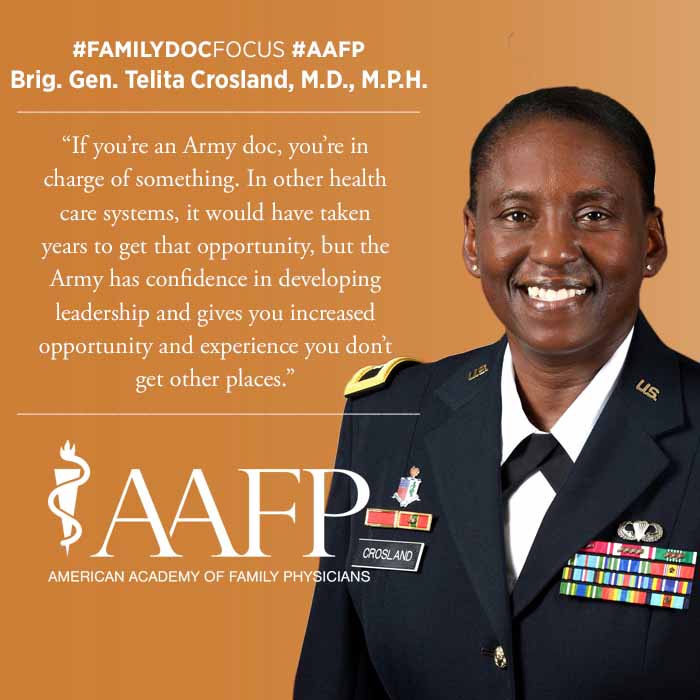Especially in the Army, FPs Are Called to Lead
February 18, 2019 12:02 pm David Mitchell – Brig. Gen. Telita Crosland, M.D., M.P.H., was fresh out of the Fort Gordon Family Medicine Residency Program when she found herself in the role of officer in charge for a U.S. Army health clinic in South Korea. She was a 29-year-old captain. A few years later, Crosland was officer in charge for the Bennett Health Clinic at Fort Hood, Texas, a facility with 21,000 patients.
"If you're an Army doc, you're in charge of something," Crosland said. "In other health care systems, it would have taken years to get that opportunity, but the Army has confidence in developing leadership and gives you increased opportunity and experience you don't get other places."
Crosland has had lots of opportunities in lots of places, moving more than a dozen times. She was an associate residency program director and later deputy chief of the Department of Family Medicine at Fort Lewis, Wash. She's also had multiple commands in Europe, at one point directing nine clinics in three countries.
Crosland took on her biggest challenge yet when she assumed command of Regional Health Command-Atlantic last summer. She is responsible for the region that includes Puerto Rico and states east of the Mississippi River, managing public health, occupational health, dental care, food inspections, graduate medical education, a medical center, four community hospitals, 16 health clinics and a myriad of detachments.
She has more than 24,000 people under her command, a budget of $1.6 billion and approximately 600,000 patients, including service members, retired military and family members.

"I've run clinics, small hospital systems and now a region," she said. "I have had amazing opportunities in the Army."
Crosland knew she wanted to be a doctor since early childhood. West Point was one of the first schools to recruit her, and it offered a full scholarship.
"My parents said, 'That sounds like a good idea,'" she said.
With college, medical school, residency and active-duty commitments, Crosland was obligated to serve 15 years. She has stayed for more than a quarter century.
"Being an Army doctor isn't something you do," she said. "It's something you become."
Crosland initially wanted to be a cardiothoracic surgeon, but she learned a lot about herself during clinical rotations -- including the fact that she didn't like the OR.
"Everybody's bowels and intestines look the same," she said.
She was drawn instead to the scope of family medicine and found that she identified with the family physicians she met.
"They cared about things holistically," she said. "To be a family doc, you not only have to be a good physician, you have to be a good person, as well. As a specialty, the diversity of work you do -- the range -- it's interesting. I loved the patients and the continuity. They say that leadership is shaped by experience. I came into the Army as a physician, specifically a family doctor."
Crosland's many roles included commander of the U.S. Army Medical Department Activity, Fort Campbell, Ky. She was the first black woman commander there.
"Another officer said to me, 'The first is an anomaly. You have to groom a second and a third,'" Crosland said. "We do a lot of mentoring."
Crosland recently participated in a panel discussion with an audience that included medical students. She made a point of mentioning that although she is a career officer and physician, she is married and has an 8-year-old son.
"It's really important for students to see a leader with a family life," she said. "People ask if you can do it all. Well, I don't know what 'all' means, but we do what we need to do, and we're happy."